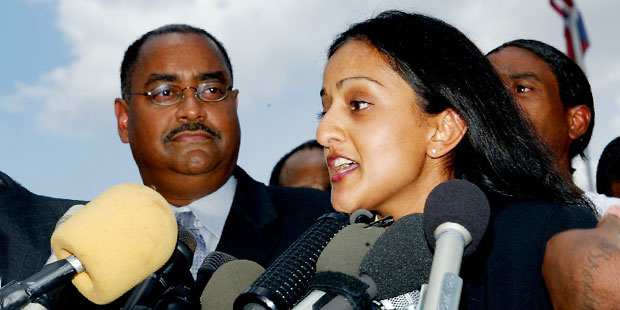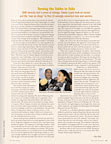Turning the Tables in Tulia
With tenacity and a sense of outrage, Vanita Gupta took on racism and the “war on drugs” to free 35 wrongly convicted men and women.
With tenacity and a sense of outrage, Vanita Gupta took on racism and the “war on drugs” to free 35 wrongly convicted men and women.
Printer Friendly VersionFresh out of law school, and just three weeks into her job with the NAACP Legal Defense Fund in New York, Vanita Gupta ’01 asked to be sent to Texas. Gupta had learned from a television documentary about a travesty of justice in a small Panhandle town called Tulia. The film described a 1999 drugs sting in which ten percent of the town’s black population was arrested and convicted on the uncorroborated testimony of an undercover cop named Tom Coleman. It turned out that Coleman was prone to using racist language and himself had been arrested for both theft and professional misconduct while carrying out his investigation. “The documentary presented facts that were almost too outrageous to believe,” said Gupta.
By the time Gupta arrived in Tulia in 2001, direct appeals by her 35 clients had already been denied. In short, they had been convicted and were without legal representation. After her initial fact-finding mission, Gupta went back to New York, organized a team of top pro bono attorneys from around the country, and returned as the LDF’s lead counsel for the cases. Nonetheless, the situation looked bleak. “The Texas Court of Criminal Appeals is not known to be a progressive court,” said Gupta, “and in any case it had already affirmed the convictions. So we really needed to blow open the case and expose the law enforcement officials for what they were.”
It may have been temerity for a 26-year-old to take on Texas, but for someone who had grown up in a leafy suburb in southern England, Gupta proved to have the tenacity and resourcefulness of a coyote. She realized she was going to have to turn up the heat on the Panhandle; so Gupta went to the media. In a series of ten articles over eleven months, New York Times columnist Bob Herbert described a justice system that seemed little more than a cruel farce.
The attention of the national press forced the Texas media into action. Local papers that had been effusing over Tom Coleman’s status as Texas lawman of the year were suddenly shamed into doing some reporting. The cartel of Tulia drug dealers, it turned out, included a fork-lift driver, a pig farmer and a number of young moms with small children who didn’t know what hit them. The dawn-raid arrests produced no drugs, money or weapons. Officer Coleman, on whose sole testimony the convictions were based, made frequent mistakes in identifying suspects, used racist language in reference to the defendants, and was in the habit of writing down evidence on his leg. And yet, on his unsubstantiated testimony, Gupta’s clients were sentenced to such brutal prison terms that many of them would have died in jail. One defendant received 341 years.
Intense media pressure outside the courtroom was vital, but it had to go hand in hand with an iron-clad argument in front of the bench. Judge Ron Chapman was struck by how well Gupta’s team handled the appeal. “Very impressive,” said Judge Chapman. “They stayed with this case for years when others would have given up.”
Gupta and her team were nothing if not relentless. The first petition was filed in January 2002 on behalf of Jason Jerome Williams. In it were the key arguments that would bring Coleman to court, and eventually undermine all 35 wrongful convictions. In September, with the glare of the national media full in the face of the Texas judiciary, the Texas Court of Criminal Appeals ruled in William’s favor. In the meantime, however, Judge Self, who had presided over most of the original trials, had made public comments to the Tulia Herald that suggested the defendants would not receive an impartial hearing in his courtroom. In November 2002, the LDF team upped the pressure by filing for his recusal. Two days later Self stepped down, and was replaced by Judge Chapman. In March 2003, the case for the prosecution dramatically collapsed as Officer Coleman crumbled on the stand. Finally, on August 22, 2003, Texas Governor Rick Perry granted full pardons to all of the defendants.
Gupta, who went to law school intending to do just this sort of work, was in her element. She applied for a Soros Justice Fellowship with the LDF specifically “to work toward reform of a broken system,” she says. Even with that perspective, says Gupta, “Tulia took my pre-existing concerns to a whole new level.”
“There were a couple of moments,” she admits, “when I felt that due to the state of the courts, and the unwillingness of anyone in the justice system to see that an injustice had taken place, we would just never get our clients out of prison.” But Gupta says the clinical training that she received at NYU gave her crucial preparation. “The experience of having clients and discussing strategy in a classroom setting was invaluable in giving me the skills I needed. In my opinion, NYU is unique in having such a strong commitment to clinical education.”
Awarded the 2004 Reebok Human Rights Award in May for her role in coordinating the Tulia trial, Gupta says that the accolade came with mixed emotions. On one hand, she says, “I felt so humbled to be honored alongside such outstanding individuals from Brazil, Afghanistan and Nigeria.” But, she adds, “I thought it was incredible that racial injustice in our criminal justice system should be seen as an international human rights issue. We continually look outside our boundaries for human rights violations, yet they are taking place here on our own soil.”
Adam Levin (’97), another NYU School of Law graduate, worked alongside Gupta and became a key advocate during the hearing. At the time, Levin was senior associate in the pro bono department of Hogan & Hartson in Washington D.C. He went on to lead the civil rights litigation that brought their clients a $6 million settlement, and instigated the disbanding of the Panhandle Regional Narcotics Task Force.
In October 2003, the Black Allied Law Students Association (BALSA) and the Law Student Drug Policy Forum invited both Gupta and Levin back to the Law School for the first time since Governor Perry pardoned their clients. “My favorite audience when I speak about the case is law students,” says Gupta, who clearly hopes that the trial will inspire others to do criminal defense and social justice lawyering. “It’s wonderful to talk about the possibility of changing people’s lives, and to have them hear from someone who has just graduated and is making a difference.”
But there’s still one more twist to the tale of Tulia; Paramount Studios is due to make the trial into a 2006 feature film. Who will play Vanita Gupta? Halle Berry.

